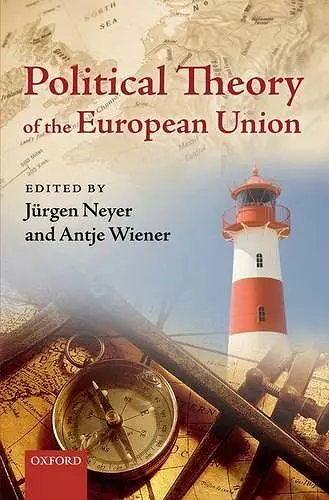Political Theory of the European Union
Antje Wiener editor Jürgen Neyer editor
Format:Hardback
Publisher:Oxford University Press
Published:4th Nov '10
Currently unavailable, and unfortunately no date known when it will be back

Debate about the theory underpinning the nature, workings, and development of the European (EU) has in many ways been hampered in recent years by an intellectual divergence in the two main ways that the EU is conceptualized. On the one hand is a political science and comparative government oriented strand that sees the EU as a political system in its own right. On the other is the international relations tradition which conceptualizes it as another international organization. Alongside this, the EU itself has developed a significant constitutional dimension. Indeed, the debate surrounding the 'Constitutional Treaty' presented several challenges to our capacity to grasp the normative change of this non-state polity. Despite the eventual contestation of the EU's 'constitutional turn' through the French and Dutch no-votes and the cumbersome procedure of ratifying the Lisbon Treaty in their aftermath, debates about the EU's constitutional quality have not ceased. In the light of these developments, the editors of this volume, along with their distinguished contributors, have attempted to create a more decisively interdisciplinary theoretical approach to studying the EU within the wider world-political context. The volume brings together scholars in a range of disciplines across the social sciences to offer, not a complete theory, but rather a theoretical approach combining different stands of political and legal theory. The book's aim is to inspire further engagement with the central tenets of political authority and world order, sovereignty and constitutional change and democracy and justice, in the context of the EU's political development.
This book is a welcome attempt to bring together a range of different disciplinary insights with a view to developing a political theory of the European Union. The attempt is animated by both empirical and normative concerns: to better understand what kind of entity the EU is and the nature of the authority it exercises, as well as to assess the EU's claim to legitimacy and the quality of its democracy and justice. There are excellent contributions from leading scholars across the fields of international relations, law and political theory which interrogate these and other questions. While not purporting to provide a fully-fledged political theory of the EU, the book helps to identify some of the building blocks for a political theory of the EU, as well as setting out a rich array of research questions for the future. Grainne de Burca, Harvard Law School Political Theory of the European Union is highly recommended for graduate students, and for scholars studying the development of the EU. It is a refreshing contribution to this area of study and should serve to stimulate further interdisciplinary research into this ever-expanding field of study. Erwin Erhadt of Thomos More College, CritCom, A forum for Research & Commentary on Europe
ISBN: 9780199587308
Dimensions: 241mm x 163mm x 22mm
Weight: 586g
288 pages